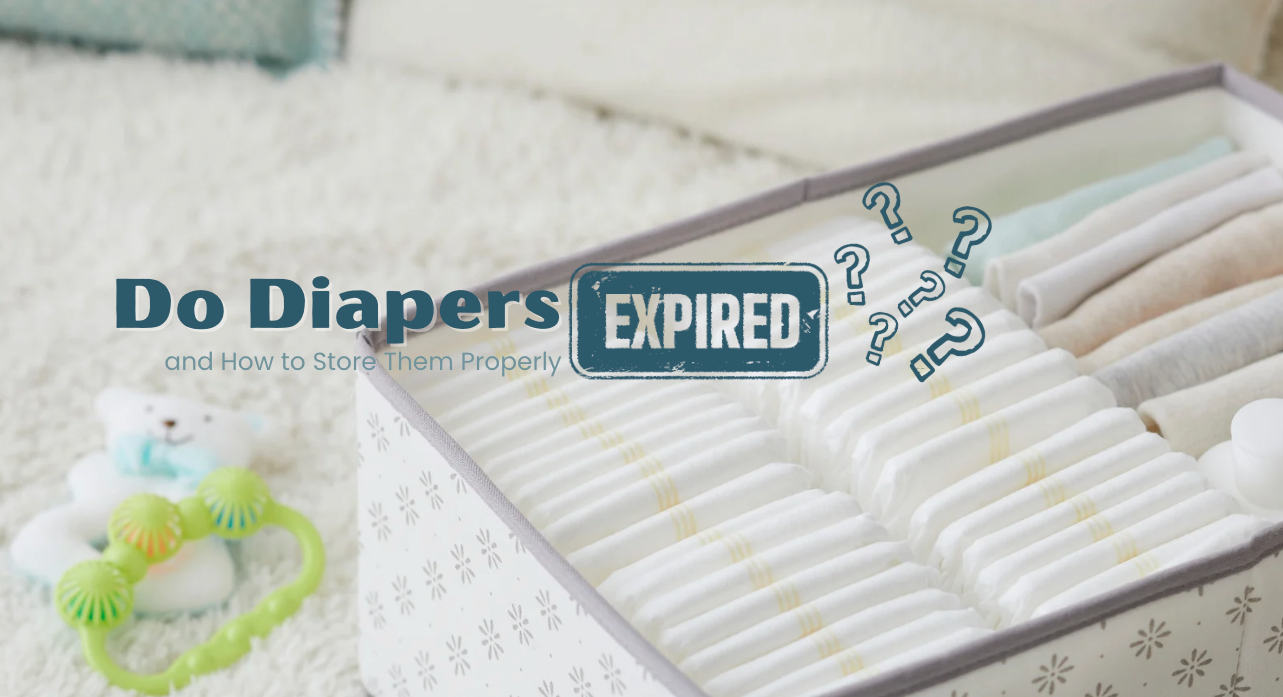You’ve probably wondered: Do diapers expire? Diapers don’t expire in the same way food does, but they can lose absorbency, elasticity, and overall performance over time.
If a diaper has been stored for years, it may feel stiffer, fit poorly, or leak more easily. You might also notice fading designs or a change in smell.
Knowing how long diapers stay effective helps you avoid waste and keep your baby comfortable.
This guide explains diaper shelf life, signs of aging, safe storage tips, and what to do with unused or expired ones.
Quick Insights 💡:
- Diapers don’t "expire" like food but degrade over time (typically 2-5 years).
- Old diapers may lose absorbency, elasticity, or develop odors.
- Unopened diapers last longer than opened ones.
- Avoid using brittle, discolored, or moldy diapers.
- Store diapers in a cool, dry place to maximize lifespan.
❝ Get fresh, high-quality diapers every month with our Wispy Cloud Diaper Monthly Box. Perfect for keeping your stash new and ready to use. ❞
Do Diapers Expire?
Diapers do not become unsafe over time, but their materials can change and lose quality. Storage conditions, age, and brand can all impact how well they perform after being stored for years.
Understanding Diaper Expiration
Diapers are made from absorbent polymers, paper, and plastic. These materials do not spoil like food, but they can break down slowly.
- Over time, the elastic in the waistband and leg cuffs may loosen. This can cause more leaks.
- The adhesive tabs may not stick as well, making it more difficult to secure the diaper.
- Colors and prints may fade. If the diaper has a fragrance, the scent can weaken or change.
These changes do not render the diaper unsafe, but they can compromise its performance.
You can slow this process by storing diapers in a cool, dry place away from sunlight and humidity. Heat and moisture can speed up material breakdown.
Do Disposable Diapers Have Expiration Dates?
Most disposable diapers do not come with a printed expiration date. Manufacturers consider them stable products that can be used for years if stored properly.
Some companies recommend using them within 2 to 3 years for optimal results. This is not a safety limit but a quality guideline.
Here are common changes in older diapers:
- Weaker elastic that fits less snugly
- Less absorbency due to clumping of absorbent gel
- Faded prints or discoloration
- Reduced stickiness of adhesive tabs
If you find an old pack, check a few before use. If they still fit well and retain moisture without leaks, they are suitable for use.
Why Manufacturers List Expiry Dates
Some brands print an expiry date or “best before” date on packaging. This is mainly for quality control, not because expired diapers become dangerous.
The date helps ensure you use the product while it performs at its best. It also gives the manufacturer a clear window for handling complaints or returns.
In some regions, regulations require a shelf life on certain baby products. This can lead to printed dates even when the product is still safe after that time.
If you see an expiry date, treat it as a recommendation for peak performance, not a strict safety deadline.
❝ Stay stocked with fresh diapers every week. Grab our Wispy Cloud Diaper Weekly Bag for easy, worry-free changes. ❞
Diaper Shelf Life Explained
Diapers do not have an official expiration date, but their materials can break down over time. Storage conditions, product type, and added features, such as scents, can affect how well they work after sitting unused for years.
How Long Do Diapers Last?
Most disposable diapers keep their quality for about two years from the date of purchase. After that, you might notice changes such as:
- Less absorbency
- Weaker fasteners or tabs
- Slight yellowing of the outer material
You can still use older diapers if they are clean and undamaged, but they may not perform as well. Some brands recommend using them within 2 to 3 years for optimal results.
Opened packs tend to age faster because they are exposed to air and humidity. Unopened packs stored in good conditions usually last longer.
Factors That Affect Diaper Shelf Life
The way you store diapers makes a big difference in how long they last. Heat, sunlight, and moisture can speed up material breakdown.
Best storage tips:
- Keep diapers in their original sealed packaging
- Store in a cool, dry place
- Avoid direct sunlight or high humidity
Plastic components can become stiff over time if exposed to heat. The elastic in the leg cuffs can also lose stretch, which may cause leaks. Paper-based layers may clump or feel less soft after long storage.
If you live in a humid area, consider placing open packs in airtight containers to protect them.
Shelf Life of Scented Diapers
Scented diapers contain added fragrances to mask odors. These scents can fade within months or change over time, especially if stored in warm or humid spaces.
While the loss of scent does not render the diaper unsafe, it can indicate that other materials have also begun to deteriorate.
Fragrance oils may also cause the diaper to absorb moisture from the air, which can reduce absorbency.
To keep scented diapers fresh:
- Store them in a sealed bag or container
- Avoid leaving them in hot cars or near heaters
- Use them sooner than unscented diapers, ideally within 1 to 2 years
If the scent smells unusual or chemical-like, it is safer to switch to a fresher pack.
Signs That Diapers Have Expired
Old diapers may still be safe to use, but they can lose quality over time. You can spot expired diapers by checking for a few clear changes.
Look for these common signs:
- Yellowing or discoloration. A bright white diaper turning yellow or off-white can mean the materials are breaking down.
- Reduced absorbency. If the absorbent core feels thinner or leaks occur more frequently, the diaper may not retain liquid as effectively.
- Brittle or stiff tabs. Tabs or elastic areas that feel hard, crack, or no longer stretch can make the diaper fit poorly.
- Musty or chemical smells. A strange odor can be a sign of moisture damage, mold, or chemical changes in the materials.
You might notice more than one of these signs at the same time. Even if the diaper looks fine, a drop in performance, like more frequent leaks, is a strong clue it has aged.
If you store diapers in a hot, humid, or sunny place, these issues can appear sooner. Keeping them in a cool, dry location in their original packaging can help them last longer.
❝ Want to make your diapers last and work their best? Read our guide on how often you should change your baby's diaper for tips that keep them fresh and effective. ❞
When Should You Not Use an Old Diaper?

Avoid using an old diaper if it shows signs of damage or poor condition. Although diapers do not have a strict expiration date, their materials can deteriorate over time.
Check for these issues before putting one on your baby:
- Unpleasant odor – A musty or moldy smell can indicate that the diaper has been exposed to moisture and may contain mold or mildew.
- Loose leg cuffs – If the elastic feels stretched out, it can cause leaks and reduce the diaper's effectiveness.
- Squishy absorbent layer – If the inside feels damp or soft before use, it may have absorbed moisture from storage, which can irritate your baby’s skin.
- Non-sticky adhesive tabs – If the tabs do not stick well, the diaper will not stay secure and may fall off.
You should also avoid diapers that look discolored or have clumping inside the absorbent core. These changes can affect performance and comfort.
If you are unsure about the condition of a diaper, it is safer to replace it with a fresh one. This helps prevent leaks, skin irritation, and possible health risks.
What’s the Best Way to Store Diapers?
Storing disposable diapers properly helps keep them in good condition and extends their shelf life. Poor storage can reduce absorbency or cause the materials to break down faster.
If the diapers are still in their original packaging, keep them sealed until you are ready to use them. For opened packs, place them in an airtight container or use a vacuum sealer to protect them from air, dust, and odors.
❌ Avoid direct sunlight. Light can fade colors and cause discoloration. Store diapers in a closet, cupboard, or opaque box to keep them out of direct light exposure.
✅ Keep them at a stable room temperature. High heat can damage the elastic and adhesive parts of the diaper. Do not store them near heaters or in hot attics.
Prevent moisture damage by avoiding areas with high humidity. Bathrooms, laundry rooms, or damp basements can reduce the absorbency of materials, causing them to clump or weaken.
Quick Storage Tips:
- Store diapers in their original packaging or in airtight containers.
- Store in a cool, dry place at room temperature or lower.
- Protect from direct sunlight to prevent fading.
- Avoid humid spaces to maintain absorbency.
|
Factor |
Best Practice |
Why It Matters |
|
Packaging |
Original wrap or airtight container |
Blocks moisture and odors |
|
Light |
Dark storage space |
Prevents fading and discoloration |
|
Temperature |
Room temperature or cooler |
Preserves elastic and adhesive |
|
Humidity |
Low-humidity environment |
Keeps the absorbent core in good condition |
What to Do With Unused or Expired Diapers
Old or expired diapers may not perform as well as new ones, but they can still serve practical purposes. You can repurpose them for non-baby uses or pass them along if they are still in good condition. Proper disposal helps prevent waste and keeps your storage space organized.
Safe Uses for Old Diapers
If diapers are past their prime but still clean and unused, you can use them for non-infant purposes. Their absorbent core makes them useful for:
- Pet training pads for dogs or small animals.
- Cleaning up spills in the home or car.
- Protecting plants by placing pieces in pots to help retain soil moisture.
You can also keep a few in your emergency kit. They can absorb leaks from containers, wrap around ice packs, or serve as padding for fragile items.
Avoid using expired diapers on babies if the elastic feels loose, the adhesive tabs don’t stick, or the absorbent material clumps. These changes can cause leaks and skin irritation.
Donation and Disposal Options
If unused diapers are still in good condition, consider donating them to a local charity or organization.
Many local shelters, food banks, and parent support groups accept open or sealed packages. Always check their guidelines before dropping them off.
Some animal shelters also accept donations of diapers to support pet care needs.
If diapers are damaged, moldy, or unusable, dispose of them in your regular trash. Do not flush them, as they can clog plumbing.
To reduce waste, consider searching for diaper recycling programs in your area, although availability may vary.
Proper disposal prevents odors and pests, especially if you store trash before pickup. Wrap diapers in a sealed bag to contain any mess.
❛❛ Discover how to select diapers that stay fresh for longer. Check out our guide for expert tips on what makes a good diaper. ❞
Final Thoughts
Diapers do not have an official expiration date, but they can become less effective after a couple of years.
Store them in a cool, dry place away from sunlight to help them last longer.
Check for signs like yellowing, stiffness, or weak fasteners. These can mean the diaper may not work as well.
If you are unsure, it is safer to use newer diapers to avoid leaks or skin irritation.
💬 FAQs: Do Diapers Expire
Disposable diapers do not have an official expiration date, but their materials can break down over time. Storage conditions, materials, and type of diaper affect how long they stay effective and safe to use.
How Long Can You Keep Disposable Diapers?
You can keep disposable diapers for approximately two to three years from the date of purchase. After that, the adhesive tabs may weaken, and the absorbent core may not work as well. Store them in a cool, dry place to help maintain their quality for a longer period.
What are Disposable Diapers Made of?
Most disposable diapers contain polypropylene and polyethylene for the outer layers. The absorbent core typically utilizes wood pulp and superabsorbent polymers to retain moisture. Some may also have elastic materials, adhesives, and dyes for fit and design.
Do Eco-Friendly Diapers Expire Faster?
Eco-friendly diapers often use more plant-based or biodegradable materials. These materials can degrade faster if stored in humid or hot conditions. With proper storage, they can last close to the same time as standard disposable diapers.
How long does it take for a diaper to decompose?
A disposable diaper can take hundreds of years to fully decompose in a landfill. The plastic components break down very slowly, while the organic components may degrade more quickly. This long decomposition time is one reason diaper waste impacts the environment.
How long do cloth diapers last?
Cloth diapers can last 2 to 5 years with regular use and good care. The lifespan depends on the fabric type, wash routine, and frequency of use. Replacing worn elastics or covers can extend their usability.











